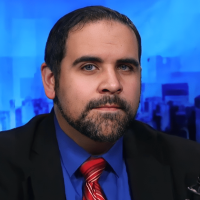Despite reports of Russia and ISIS being at odds with one another, further research points to Russian security services (FSB, successor to the Soviet KGB) and military intelligence (GRU) behind the very threat while ostensibly opposing it.
“The banner of Islam may lead into [the] struggle for liberation,” declared Leonid Brezhnev, general secretary of the Communist Party of the Soviet Union (CPSU) on February 23, 1981.
When Brezhnev said these words in his “Report of the Central Committee of the CPSU to the XXVI Congress of the Communist Party of the Soviet Union” at the Kremlin, he had just finished exalting the recent Islamic Revolution in Iran as being “essentially an anti-imperialist revolution,” and as a successful example of the many national liberation movements supported by the Soviet Union in its two-fold global objectives of building world communism and defeating Western “colonialism and imperialism.” Brezhnev’s Soviet policy of building communism under the guise of Islam eventually culminated in the Soviet creation of the USSR Islamic Revival Parties in the late 1980s.
In 1990, the inaugural congress of the Islamic Revival Party was hosted in Astrakhan, an oblast, or administrative division, in the lower Volga region of Russia bordering Kazakhstan. Around the same time, the USSR also authorized the establishment of Islamic Revival Parties in the Tajik Soviet Socialist Republic (Tajik SSR, now Tajikistan) and Uzbek Soviet Socialist Republic (Uzbek SSR, now Uzbekistan). Rather than Marxism-Leninism, like the CPSU, which authorized the establishment of the Islamic Revival Parties, the Islamic Revival Parties proclaim a fundamental Islamist ideology.
In the book Islam V Astrakhanskom Regione (2008), which contains many copies of official documents issued by the Islamic Revival Party Congress, one particular Islamic Revival Party activist is quoted as saying, “We are labeled extremists. But this is not true; we simply support the purity of Islam and its precepts. We will have to revive our own religion throughout the whole world.”
With the Soviet authorization of the Islamic Revival Parties in the Muslim-populated areas of the USSR, the CPSU had provided the more radicalized Muslims of the USSR with a political home from which to further voice their message at home and abroad throughout the Muslim world.
One of the early founders of the USSR Islamic Revival Party was the late Chechen terrorist and Wahhabist ideologue Supyan Abdullayev, originally born in the Kazakh Soviet Socialist Republic. According to the daily Moscow-based newspaper Moskovskij Komsomolets, formerly the periodical organ of the Moscow City Committee of the All-Union Leninist Young Communist League, “Abdullayev stood on the positions of radicalism well before the collapse of the USSR and the organization of the ‘Islamic Revival Party’.” The Moskovskij Komsomolets further reported:
According to some reports, back in the 1980s Abdullayev was recruited by the KGB. Since 1991, he actively participated the rebellions in Chechnya starting with the first Chechen campaign fought against federal troops. By 1996, he was appointed deputy commander of the famous “Islamic battalion.” In August of the same year he participated in the attack on Grozny.
Then Aslan Maskhadov appointed Supyan Abdullayev to the position of deputy head of the Ministry of State Security Sharia (the equivalent of our FSB). [Translated from Russian.]
Aslan Maskhadov was the third president of the self-declared Chechen Republic of Ichkeria, until his death on March 8, 2005. And like Abdullayev, Maskhadov was also born in the Kazakh SSR. It was during Maskhadov’s reign that Abdullayev rose to the rank of brigadier general. Abdullayev remained loyal to Maskhadov until his death.
Abdullayev then joined the Caucasian Emirate, where he again quickly rose through the ranks serving as one of their leading field commanders and chief ideologist for its leader Dokka Umarov. Originally organized as the Caucus Front or Caucasian Mujahadeen, the Caucasian Emirate is a separatist militant Salafist Jihadist terrorist organization allied with al-Qaeda, the Taliban, the al-Nusra Front in Syria, and ISIS. In fact, Abu Omar al-Shishani, one of ISIS’ top field commanders, admitted in an interview with the jihadist Russian-language website Beladusham.com that he arrived to fight in Syria “on the orders of Amir Abu Uthman (Dokka Umarov) and for a certain amount of time he has supported us financially.” [Translated from Russian.]
In an interview with DELFI, a daily news website servicing Estonia, Latvia, Lithuania, and Ukraine, former Chechen Prime Minister Akhmed Zakayev admitted that Umarov was in fact an asset of Russian security services, the FSB and GRU (Russian military intelligence):
We announced it many times. In 2007, Umarov declared war to America, Great Britain and Israel. Before this statement, Dokka was in the radar of Russian secret services, but was released by some miracle, and announced this statement. Umarov is under full command of Russian special services. To this day he was (and will be, I’m sure) performing the tasks assigned to him by these structures.
If this admission holds accurate, it would further corroborate that Russia is behind the very Islamic terrorism while ostensibly opposing it. Umarov’s 2007 declaration of war against not only America and Great Britain, but also the Jewish state of Israel, would also be consistent with the KGB’s historic role in fermenting Islamic terrorism under the guise of Muslim fears and hatred toward Israel.
In his book Disinformation (2013), former high-ranking Soviet-bloc defector Lieutenant General Ion Mihai Pacepa — who served as chief of the Securitate, the Department of State Security for Communist Romania — revealed Moscow and the KGB’s role in exploiting and radicalizing Islamic anti-Semitism and terrorism against Israel in particular:
By 1972, Andropov’s disinformation machinery was working around the clock to persuade the Islamic world that Israel and the United States intended to transform the rest of the world into a Zionist fiefdom. According to Andropov, the Islamic world was a petri dish in which the KGB community could nurture a virulent strain of American-hatred, grown from the bacterium of Marxism-Leninism thought. Islamic anti-Semitism ran deep. The message was simple: The Muslims had a taste for nationalism, jingoism, and victimology.
Yuri Vladimirovich Andropov was the longest serving chairman of the KGB, from 1967 to 1982, and briefly held the position of general secretary of the Communist Party of the Soviet Union (GS-CPSU) from 1982 until his unexpected death in 1984. In Disinformation, Pacepa elaborated on how Andropov’s KGB accomplished its anti-Semitic exploitation and radicalization of Muslims:
The Securitate’s first major dezinformatsiya task in the new World War III was to help Moscow reignite anti-Semitism in Western Europe by spreading thousands of copies of an old Russian forgery, The Protocols of the Elders of Zion, in that part of the world. It had to be done secretly, so no one would know the publications came from the Soviet bloc.
According to Pacepa, “The Protocols, which claimed that the Jews were plotting to take over the world, was a Russian forgery, compiled by a disinformation expert, Petr Ivanovich Rachovsky, who worked for the Okhrana (Department for Protecting the Public Security and Order) in the days of the tsar.”
To this day copies of The Protocols of the Elders of Zion, translated in Arabic and Farsi, are circulated throughout the Middle East and Muslim world and remain on the top reading lists for jihadists. In light of decades of Soviet sponsorship of international terrorism and aforementioned FSB connections to ISIS reported in this article, the Kremlin’s role behind ISIS is becoming increasinly more evident.
Photo of the Kremlin: NVO
Related articles:
FSB Director Admits Russians Fighting for ISIS





